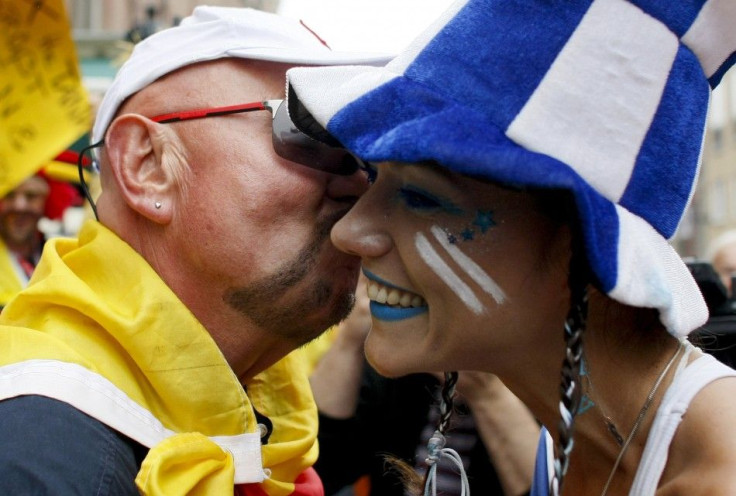Soccer As War By Other Means? Germany And Greece Square Off At Euro 2012

War is a mere continuation of politics by other means. -- Carl von Clausewitz, Prussian soldier and philosopher
The Battle of Waterloo was won on the playing-fields of Eton -- the Duke of Wellington
On the geopolitical and financial front, Germany has crushed Greece in recent years, but the Greeks could take revenge on their Teutonic tormenters on the pitch as the two countries face off in the Euro 2012 soccer tournament quarterfinal in Gdansk, Poland, on Friday.
Of course, even if Greece wins this match, their homeland will still be mired in huge unemployment and facing drastic spending cuts, pension freezes, rising health care costs and an austerity program that is making the country's recession worse and ill likely keep the Greek public under the heel of euro zone lenders for many years to come.
Yet, a victory on the soccer field may provide some much-needed restoration of Greece’s wounded national pride --- and the Germans (who once brutally occupied their country during World War II and now are still seen by many Greeks as an oppressive foreign power), make for a deliciously ideal opponent.
Certainly, as far as Greek media is concerned, the quarterfinal is much more than just a mere game of footie, with much of its ire focused not on the German team players, but rather on Chancellor Angela Merkel, who has repeatedly been portrayed as a modern-day Nazi.
Headlines in Athens sports pages include such nationalistic gems as Bring on Merkel, We're part of the G8 of European football and even the hilarious Kick the Germans out of the Euro.”
“The referee should give Merkel a fright and toss a drachma coin at the beginning of the match,” sneered Greece's Live newspaper.
(Merkel herself will reportedly make an appearance at the match, as will Greece’s new prime minister, Antonis Samaras. No word on whether they'll sit next to each other, as often happens with political leaders at the Euro and World Cups.)
Merkel has become something of a good luck charm for the German team, having personally witnessed their 4-0 victory over Argentina at the 2010 World Cup, as well as the defeat of Turkey in Berlin during the Euro 2012 qualifier.
German media is also getting in the swing of things.
Germany’s Bild newspaper annoyed many in Greece by revealing that Greek players spent their time at their Warsaw hotel smoking and cursing (it was later revealed that only coach Fernando Santos was doing the smoking, and he’s not even Greek, but rather Portuguese).
“Be happy, dear Greeks. The defeat on Friday is a gift, Bild quipped. Against [German national team manager] Jogi Loew, no rescue fund will help you.'”
Some German politicians have even rubbed it in Greece’s nose.
[The Greek team] have more chance of getting their country back in order than winning the football game against Germany, Ralf Stegner of the Social Democrats told reporters.
“Greece at halftime of Euro match asks Germany for emergency loan of 4 players,” joked economist Bill Easterly in a tweet.
However, not everyone is happy over the media (in both Greece and Germany) using a soccer game as a symbol for much larger – and far more important -- geopolitical issues.
“Greece or Merkel or Samaras, that is one thing; football is a whole different story, a Greek fan named Konstantinos Pavlou complained to German media. Football is joy, and we won't let anyone ruin that.
After Greece beat Russia, we Greeks were the first to blow this all up with headlines like 'Bring on Merkel.’ But then the Germans overreacted and attacked some of the Greek players personally, Dimitris Kanellos, editor of Eleftheros Typos, an Athens daily, similarly told Germany's Deutsche Welle news website. Captain Giorgos Karagounis was even ridiculed.
“Our national pride really should not depend on whether Karagounis does well with the ball, Greek sports columnist Antonis Panoutsos cautioned his countrymen.
From a purely football perspective, Germany is expected to win because it has the superior team, once again making Greece an underdog. From this vantage point, an upset win by Greece could indeed have a beneficial (short-term) psychological effect upon a public beleaguered by five straight years of recession.
“The Greeks know that Germany is among the favorites to win the tournament, and Germany knows to expect their opponents to stay back and defend,” said Kanellos. “Germany will have to break through the Greek wall to get a win. And the Greeks have nothing to lose.
Germany has some other advantages, as well -- the team has beat Greece in eight prior matches and has also won all four European Championship quarterfinals it has competed in.
And historically, Germany is a superpower with three World Cup trophies, while Greece has never won any. Yet Greece won the 2004 Euro Cup, the only major title in its football history, in a major upset that sent Greeks to the streets to celebrate for days -- a sight that is certain to be repeated should Germany be vanquished Thursday.
The Greeks will definitely not be able to bring us to our knees, boasted Sami Khedira, a midfielder on the German team.
“We are playing for our shirt, our flag and for the people back home,” echoed Greek midfielder Costas Katsouranis.
“People [in Greece] have so many problems in their everyday lives, commented Greek striker Dimitris Salpigidis. We're really hoping that we can put a smile on their face.”
© Copyright IBTimes 2025. All rights reserved.





















